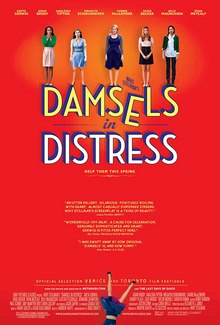
The first time I watched “Damsels in Distress,” Whit Stillman’s most recent (after a twelve-year hiatus) film, I thought it was very funny and full of great, surreal dialogue (Stillman’s characters talk like people in books, but then so do I, so I feel right at home), but I wasn’t sure it succeeded as a total work of art. After a second viewing, and a third with the commentary track on, I’m now convinced that it actually works very well, taken on its own terms. In fact, it’s now my favorite of Stillman’s movies.
The film (set, like much of Stillman’s work, in a universe a little loosely moored in time) starts with Lily (Analeigh Tipton), a transfer student, enrolling at Seven Oaks College in New York State. She meets the Girls With Flower Names, and accepts their offer to let her move in with them. Their leader is Violet (Greta Gerwig), who speaks with great conviction and eloquence, and is wrong in almost every factual statement she makes. But she has a great heart, and has devoted her life to helping others. She and her friends run a campus suicide prevention center, where they offer donuts and tap dancing lessons to the clinically depressed. Her great dream is to benefit mankind by starting a dance craze, like the Charleston or the Twist. She prefers to date guys who are neither especially good looking nor especially bright, feeling she can help them achieve their potential, if any.
Next is Rose (Megalyn Echikunwoke), who speaks in a refined English accent which, we eventually learn, is a complete affectation. She defends it in one scene as her way of striking a blow for excellence in the world. “Vulgarity is blasphemy!” she says. She keeps her distance from boys, having essentially dismissed them all as either doofuses (properly termed “doufi,” according to Violet) or “playboys or operay-tores.”
Then there’s Heather (Carrie MacLemore), who’s dumb as a doorstop, but so adorably beautiful and sweet that I think I missed some of the action because I couldn’t take my eyes off her.
Seven Oaks, as a school only recently gone coeducational, is naturally a swamp of barbarism. The most obvious barbarians are the frat boys of the Latin letter fraternities (Greek letters would be too much of a challenge for these guys), who act pretty much as you’d expect. The equal and opposite barbarians are the campus progressives, determined to close the frat houses as strongholds of elitism. “How can they be elitist? They’re morons,” Violet asks, reasonably. She also points out that if the houses are closed the morons will have nowhere to live, a problem that does not interest the progressives.
The story proceeds following Violet’s repeated disappointments in love (Asked at the suicide center whether she’s depressed, she replies that she prefers to say she’s in a “tailspin.” This sets off a debate over whether she qualifies for a donut). Still, she refuses to hold a grudge and persists in her crusade to preserve a scrap of civilization at Seven Oaks. The film ends in the style (more or less) of a Fred Astaire movie.
I think a clue to the meaning of Damsels in Distress is that Violet is not in fact a very good dancer. It seems to me she’s an alter ego for Producer/Director/Writer Stillman. He’s a Christian working in an entertainment medium, and there’s a certain embarrassment that goes with that. The Christian artist knows he’s not directly preaching the gospel or feeding the poor, but he holds to a slightly absurd conviction that in some way he is glorifying God through practicing his vocation – even if it’s only making people laugh. Violet’s occasional references to Christianity support this, I think. Violet dances awkwardly, but she dances with all her heart, as to the Lord.
Highly recommended, though I know not everyone will like it. Cautions for language and sexual references.
Lars Walker is the author of several published fantasy novels, the latest of which is an e-book, Hailstone Mountain.
